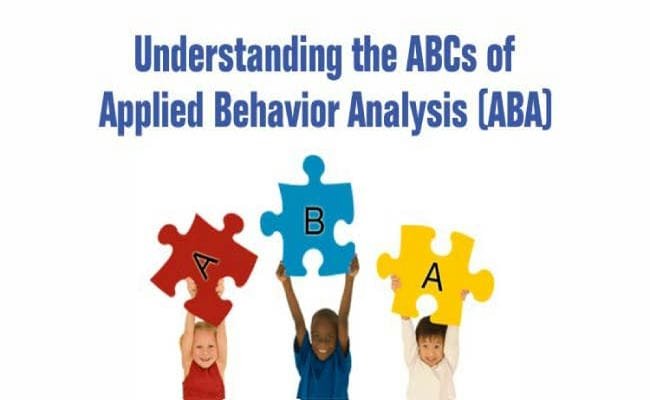
Learn About Life Insurance and Get Your Life Insurance Quotes
October 6, 2020
Countries Which Love Counter Strike Global Offensive
October 7, 2020The Benefits Of Applied Behavior Analysis
Hello friends how are you all? Today we are going to talk about The Benefits Of Applied Behavior Analysis. Applied behavioral analysis (ABA) therapy has become the common therapy that children with autism receive, and it is usually early intervention and school programs that pay for it. As a result, it’s usually called autism therapy, but it doesn’t deal with the major symptoms of autism, like social or emotional problems and sensory dysfunctions.
Instead, ABA teaches your child with autism the right behaviors in different settings and various levels. Keep in mind that ABA was developed many years ago and has become one of the best techniques of behavioral therapy provided to children with autism. Simply put, ABA is now perhaps one of the most recommended therapies for children with autism. This page discusses the benefits of applied behavior analysis.
Why Applied Behavior Analysis Has Become Popular
No doubt, behavioral therapies for treating autism, especially applied behavioral analysis are quite popular. Therefore, it’s not surprising to see that there is a variety of undergraduate and graduate programs that are offering ABA and its related content. There are good reasons why applied behavioral analysis is usually offered to those with autism.
Remember that applied behavioral analysis has been practiced for a long time. It was derived from behaviorism that B.F. Skinner developed in the mid-1900s. Because of this, it’s well-understood and established, though ABA is considered to be a broad-ranging and gentler technique than most of the other earlier forms of behavioral therapies.
The results of ABA have been significantly studied for many years. This is the reason why this technique is popular as it provides clear and measurable goals, and every therapist implements them in much the same way.
Since every therapist implements ABA in very much the same way, you can rest assured that it’s quite easy to train people to implement it. In most cases, trained professionals usually develop the applied behavioral analysis programs and paraprofessionals implement them.
Applied behavioral analysis has clear goals to make it easy to see and measure its success. As a result, ABA therapy is regarded as one of the best therapies compared to others.
For example, developmental therapies are designed to fit each child’s specific strengths, challenges, and interests. However, it’s hard to think of it as more effective than others because it can be difficult to compare the techniques head-to-head.
Many children who have autism can have pretty challenging behaviors like aggression and self-abuse. So ABA therapy is quite effective in reducing such negative behaviors while promoting desired behaviors.
What You Need To Understand About Aba Therapy
First of all, behavior analysis originates from the idea that any behavior, regardless of whether they are confusing or challenging, you can understand the specific behaviors by observing, recording, and analyzing them. When you understand these behaviors, then you can modify them based on the needs and desires of a child or adult whose behavior is at issue.
Therefore, ABA therapists usually check children with autism and observe and record their desired and undesired behaviors. Once they do this, they recommend or put in place various interventions to encourage and teach your child certain behaviors or even get rid of others.
In the past, some interventions were considered to have negative consequences. Thankfully, you can now find many specialists that believe punishment is morally wrong and useless.
Applied behavioral analysis is applied in various ways depending on the beliefs of the practitioner or school. The most common form of it is known as discrete trials.
In the discrete trial, a therapist can ask your child with autism to perform some desired behaviors like picking up an item, saying a word, and many others. So if your child performs a specific task, they are given a reward which can be a small treat.
However, if your child fails to comply with the command, then the therapist can try again and again. Recently, experts have developed new types of ABA designed to engage your child in natural settings like the lunchroom or playground. Aside from this, new theories related to behavior in autism are leading to more techniques like the token economy and pivotal response ABA.
If you decide to use a therapist to teach your child with autism new behaviors, make sure that you choose the one with proper certification in behavior analysis. Even better, various universities are now offering degree programs in behavior management and autism.
In most cases, behavioral specialists come from related fields, such as psychology, education, and many others who have studied specific courses and have enough experience to observe, analyze, and manage challenging behaviors.
Why Your Child With Autism Needs To See A Therapist
Applied behavior analysis therapists focus on building desirable behaviors and eradicate undesirable ones. Children who have autism usually find it hard to develop certain forms of desirable behaviors, such as interacting with others, making eye contact, or using speech properly.
Also, such children may have some undesirable behaviors, such as flapping, spinning, self-abuse, kicking, running into traffic, and hitting. Sadly, autistic people can also have some undesirable ways to prevent doing what they don’t like doing. These include sliding under the table, humming, or other non-preferred activities.
Hence, ABA therapy is there to help these children and adults to develop positive behaviors while reducing the negative ones. This can make it easier to include your autistic loved one into community activities, general education settings, and other usual settings.
Therefore, if your child or loved one is autistic, then you need to find a credential therapist who is trained in behavioral analysis to help you. But if the challenging behavior happens in a school setting, the school may likely bring in a therapist or a behavior specialist they think is qualified. You can still say your opinions on the chosen specialist, though it can be hard to make any changes.
There are also local and state intervention programs designed for children who are aged 3 years old and below. So you can have a choice of finding a specialist to come to your home to help you, especially concerning family life. You can also find other behavioral consultants in local hospitals, universities, and autism clinics.




